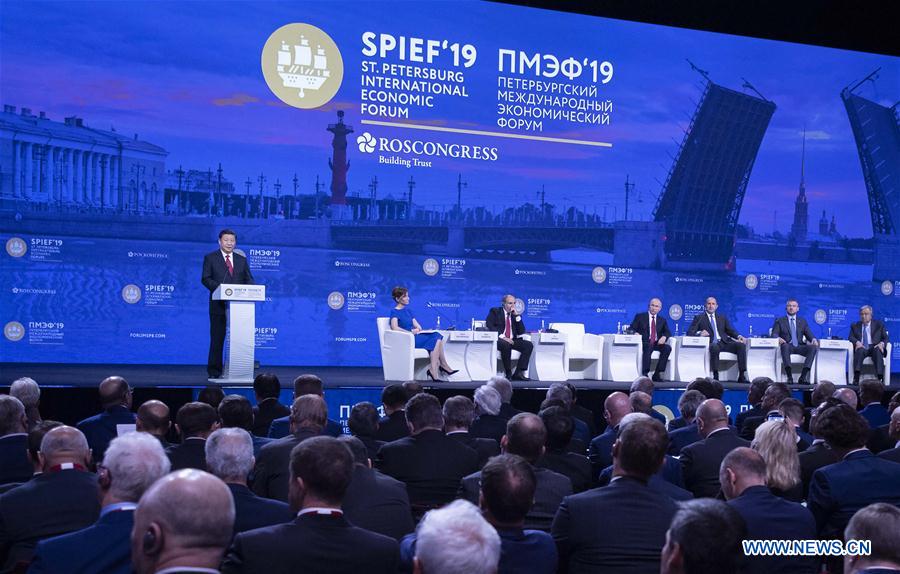
Chinese President Xi Jinping (1st L) addresses the plenary session of the 23rd St. Petersburg International Economic Forum (SPIEF) held in St. Petersburg, Russia, June 7, 2019. Xi Jinping on Friday attended the plenary session of the 23rd SPIEF along with Russian President Vladimir Putin, Bulgarian President Rumen Radev, Armenian Prime Minister Nikol Pashinyan, Slovak Prime Minister Peter Pellegrini, United Nations Secretary-General Antonio Guterres and other guests. (Xinhua/Li Tao)
ST. PETERSBURG, Russia, June 8 (Xinhua) -- Participants at the 23rd St. Petersburg International Economic Forum spoke highly of China's efforts in upholding multilateralism and strengthening mutually beneficial cooperation for the sake of sustainable development as the forum concluded Saturday.
Chinese President Xi Jinping on Friday called for joint efforts in forging ahead with sustainable development and the building of a community with a shared future for mankind in his address to the forum's plenary session.
Facing the world's profound changes unseen in a century, said Xi, China stands ready to make joint efforts with the international community to create an open and pluralistic world economy, a happy society that is inclusive and benefits all, and a beautiful homeland with harmonious coexistence between humanity and nature, and explore a new path of sustainable development.
COMMITMENT TO GLOBALIZATION
Echoing Xi's remarks, other attendees at the forum agreed that globalization is an irreversible trend of the times and countries need to work together to address various problems and challenges facing humanity.
They said that China has become an important force in safeguarding multilateralism, international rules and free trade.
"There is an understanding that it is necessary to find a way to move towards a fair globalization that benefits all," UN Secretary-General Antonio Guterres said.
Guterres also called for the implementation of the Sustainable Development Goals, which are proposed by the United Nations to address a string of global challenges.
The UN secretary-general highlighted the accomplishment achieved by China in fighting poverty, hailing the Chinese government's determination of eradicating poverty in 2020.
"We have to recognize that the most remarkable achievement in fighting poverty by countries in the world is done by China in the last few decades," Guterres said.
Addressing the forum, Russian President Vladimir Putin said that there have been worrying developments in the world. Since the international financial crisis in 2008, he noted, the structural problems of the world economy have not been fundamentally resolved, and the effectiveness of international trade as an endogenous driving force for world economic growth has declined, giving rise to protectionism.
He called for efforts to seek a new international order on the basis of international consensus, with real respect for the United Nations' core role in international affairs, and full consideration of the development rights and interests of developing countries. He pledged Russia's willingness to work with the international community to cope with the common challenges.
MORE BRI COOPERATION
Xi recalled at the forum that he put forward the Belt and Road Initiative (BRI) in 2013 to realize win-win cooperation and common development among countries, adding that the initiative, highly compatible with the UN 2030 Agenda for Sustainable Development in terms of goals, principles and implementation approaches, has received positive response and support from the international community.
Other leaders expressed their willingness to deepen cooperation with China within the framework of the BRI and agreed to strengthen the synergy between the BRI and their respective development strategies and such regional cooperation mechanisms as the Eurasian Economic Union (EAEU).
Noting that China "plays one of the key roles in the world economy," Armenian Prime Minister Nikol Pashinyan said that the high dynamics in the development of Armenia-China relations also benefit the EAEU.
"I believe it is a priority to implement the idea of pairing the EAEU with the BRI," said Pashinyan. "It is fully logical and rational."
Bulgarian President Rumen Radev also expressed his support for the BRI and said his country even proposed to open a center for global partnership, designed for the BRI, in its capital to increase efficiency in joint work.
"It is a clear example that we are going forward, and we have great expectations behind this initiative ... We are highly interested in China's initiatives, in China's investment and in mutual projects," Radev said.
CHINA'S CRITICAL ROLE
As the world encounters rising anti-globalization pressure, it is necessary to safeguard multilateralism and stick to win-win cooperation, in which China is playing a critical role, Russian experts said.
"What President Xi says is truly globalization, which is built on the modern achievements of science and technology, the achievements of modern free trade and the achievements of the work of the World Trade Organization," said Vladimir Yakunin, head of the State Governance Department Faculty of Political Sciences of Moscow State University.
The Chinese president is trying to get all parties concerned to return to the understanding that it is impossible to achieve their well-being at the expense of the problems of others, he added.
Alexander Lomanov, chief researcher at the Center for Asia-Pacific Studies of the National Institute of World Economy and International Relations of the Russian Academy of Sciences, said that the Chinese agenda is very positive and constructive as always.
In this sense, China has the opportunity to rely on like-minded people who already exist and will appear among the partner countries along the "Belt and Road," including in the Eurasian region, according to him.
"Chinese ideas are not without grounds. They have a very big, good perspective," Lomanov said.



